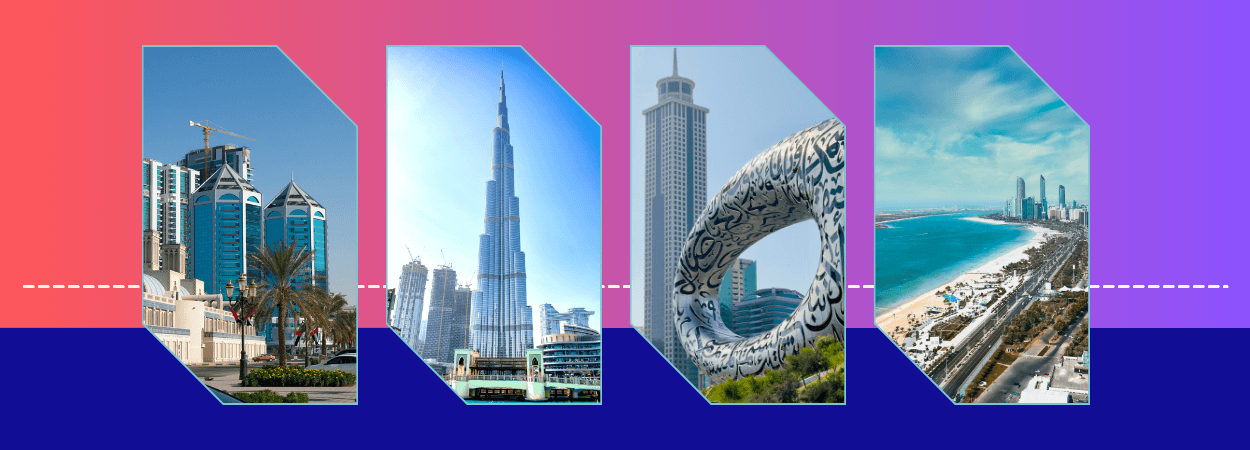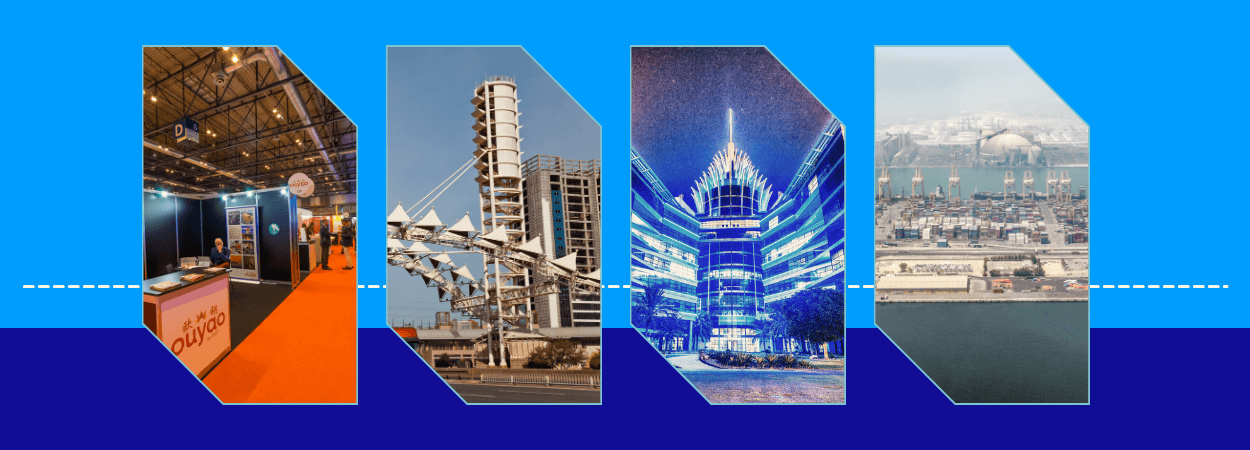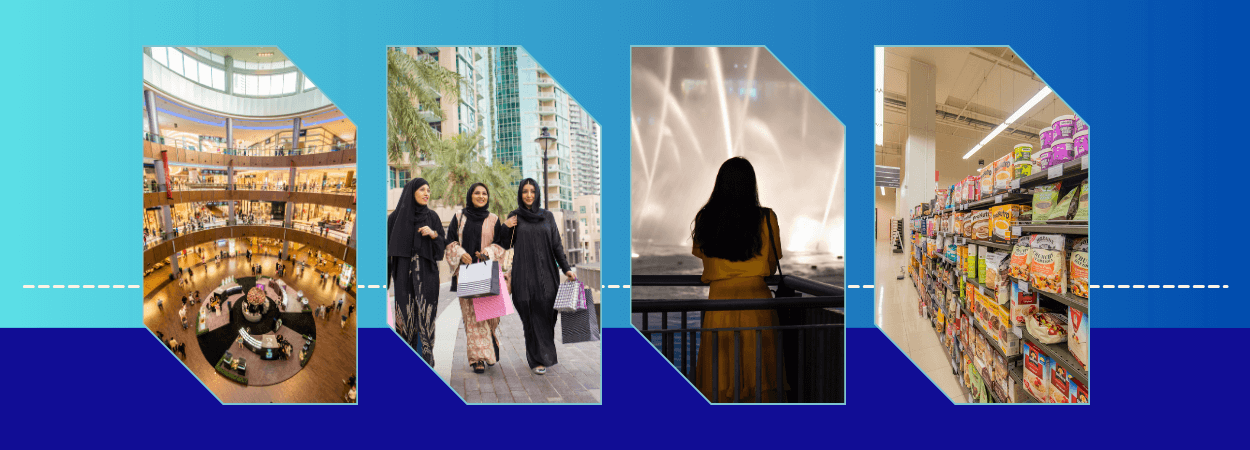- UAE - Market Overview
-
UAE Market Entry
- Why Dubai
- Do's and Don'ts
- Business Jurisdictions
The United Arab Emirates (UAE) has been the top European, Asian and US export market in the Middle East and Africa region since 2009 and is a global hub for over 1,500 plus multinational companies doing business throughout the Middle East, Africa, Europe, and Asia. The UAE has a dynamic economy, which is diversifying quickly as it aims to transform itself into a knowledge economy. The UAE’s openness to international business and strategic location as a gateway to the region create business opportunities and make the UAE an attractive market for global business entrepreneurs.
The pandemic dealt a twin blow to the UEA’s economy, driving down oil prices and reducing the country’s oil revenues, and significantly impacting the non-oil economy that was dependent on aviation, tourism, and trade. As a result, real GDP fell by 6.1% in 2020, before picking up with a growth rate of 2.1% in 2021, an estimated growth rate of over 5% in 2022, and a projected growth rate of 4.2% in 2023, according to the International Monetary Fund. The UAE recovered to pre-pandemic levels of economic activity in 2022. Amidst the disruption of the pandemic and current economic environment, UAE officials are implementing notable reforms to attract investment and capture first-mover advantages in several sectors.
National and Emirate-level governments invest heavily in economic diversification and growth. With its oil reserves and sovereign wealth funds valued at approximately $1.3 trillion, the UAE has significant resources, without the structural liabilities some of its neighbours must sustain, to help it navigate the volatility of the oil market and other challenges. The UAE aims to expand its role as a major player in regional and even global trade, logistics, tourism and digital hub.
The UAE named 2023 as the Year of Sustainability and UAE hosted the COP28 U.N. climate conference in November-December 2023. The UAE is co-locating several major events at COP28 such as the Abu Dhabi Sustainability Week (ADSW) and the Global Manufacturing and Industrialization Summit (GMIS) that will help create engagement opportunities for global companies. The UAE’s commitments and investments in clean energy and clean-green technologies are creating many opportunities for global companies.
The UAE is home to world-class trade events and visiting or exhibiting at a trade event can be a great way to learn about and expand in the UAE and the region.
Top trade events include these events in strategic industry sectors, and more information can be found in the leading sectors chapters, important trade events are listed below
- ADIPEC (Energy, Oil and Gas), Abu Dhabi, October 2-5, 2023.
- GITEX (Information Technology), Dubai, October 16-20, 2023.
- Dubai Airshow (Aerospace and Defense), Dubai, November 12-16, 2023.
- WETEX (Water, Environmental Technology, Solar), Dubai, November 15-17, 2023.
- Arab Health (Healthcare), Dubai, January 29- February 1, 2024.
- IDEX (Defense), Abu Dhabi, February 17-21, 2025.
While the UAE has a bright future and presents many opportunities for global companies in the long term, the UAE market’s structural and regulatory challenges require preparation and foresight. These are covered in the sections discussing challenges and intellectual property rights as well as other chapters. Due diligence is highly recommended, as it is when doing business in any international market, and it is important to be wary of scams and frauds – we receive frequent inquiries from many companies solicited by alleged UAE investors and buyers that turn out to be scams.
To summarize, the UAE offers an attractive long-term market while presenting near-term challenges primarily associated with lingering fallout from the pandemic. That said, of all the potential markets in the Middle East Africa region, the UAE cannot be overlooked due to its forward-looking outlook, ambitious vision, and healthy balance sheet, thanks to its significant sovereign wealth. OJO’s team of experienced specialists in Abu Dhabi and Dubai are ready to assist your companies in entering and expanding in this market, and we encourage you to take advantage of the opportunities in the region.
The UAE has an open market economy and there are several market entry options available for exporters. Here are some highlights of UAE market entry suggestions for your business growth.
Trade Events
The UAE is a regional commercial hub and hosts world-class trade exhibitions and conferences where U.S. companies can meet buyers from the UAE, the Middle East, Africa, South Asia, and around the world. The U.S. Commercial Service offices in Abu Dhabi and Dubai support a wide range of trade exhibitions and promotion events designed to help U.S. companies that are seeking to enter and expand in the UAE and regional markets.
Distributors and Agents
Working with a distributor or agent is an option for entering the UAE market. Finding the right local agent or distributor can be a critical first step for success. Due diligence is crucial. The U.S. Commercial Service team has business matchmaking services available to meet qualified distributors and agents and to help with due diligence.
Free Trade Zones (FTZs)
Free Trade Zones allow 100% foreign ownership, quick registration, and advanced logistical support. They are often organized along sectoral lines.
Competitive Positioning
As a regional trade hub supporting significant international business activity, the UAE is a market where CORPORATES can expect to face strong multinational competition. Successful companies often rely on technological and qualitative advantages, customer service, and after-sales service to compete with foreign companies that may have lower price points.
Regional Approach
Many companies looking to do business in the Middle East often find advantages in a regional approach. The Gulf region is also one of the largest and fastest-growing export markets for goods and services. The members of the Gulf Cooperation Council (GCC – UAE, Kuwait, Qatar, Oman, Saudi Arabia, and Bahrain) have taken steps to harmonize standards and regulatory measures.
There are no limitations on what you can pursue as an entrepreneur. UAE always welcome people with business ideas to its global exposure and opportunity in the market. The country provides several opportunities with endless benefits. Before you consider setting up a company in the UAE, select the right jurisdiction. You may be wondering, what are the jurisdictions? OJO Team have experts dealing with all the UAE jurisdictions namely Mainland, Freezone and Offshore business in the UAE
In the global market Dubai has risen from a sandy, peaceful beachfront to lofty heights. Dubai is renowned as a land of opportunities and a paradise for dreamers. It demonstrates how foresight and innovation may lead to a brighter future. Within the UAE, Dubai is already a significant player in the global marketplace and is well-positioned to determine the world’s digital future. As a result, it’s no surprise that the city draws businesses from all over the globe. So, anyone wishing to expand their business and keep up with the fast-paced world might choose Dubai.
A Glimpse At Dubai’s Burgeoning Economy
Before starting a business, the essential thing one should consider is to think about the economy of Dubai. Knowing about Dubai’s growing economy benefits all business people, entrepreneurs, and investors. So, there’s no harm in learning about the economy. Please have a look at it to get a brief overview. The Dubai Economy increased by 3.4 percent in 2022, according to a recent estimate from Dubai’s Department of Economic Development. The emirate’s long-term economic potential depends on trade, local manufacturing, e-commerce, a reviving real estate market, and the resurgent tourist industry. The Dubai economy is well-positioned to shift smoothly to the next phase of its economic cycle. In addition, it is predicted that Dubai’s non-oil private sector economy will grow further, owing to an increase in new orders.
What Makes Company Formation In Dubai The Ideal Location For Conducting Business?
When people observe Dubai’s economy, they are attracted to start a business or invest there. Dubai is situated halfway east and west, connecting the best of both worlds. It also has harbour and airports, which makes logistics easier for supply of goods and services. As a result, businesses involved in international trade, import and export, tourism and logistics may thrive in this region. Moreover, as you are interested in doing it, you should know why it is a suitable place for doing business. Dubai’s strategic position, political and economic circumstances, superb infrastructure, tax exemptions, expat-friendly visas, and comfortable lifestyle lures one to start a business in Dubai.
Do’s | Don’ts |
Do select the ideal company formation | Don’t be too casual |
Do you get the right license | Don’t keep to yourself and operate in a silo |
Do find a reliable sponsor if required | Don’t complicate things – take professional help |
Do get your visa requirements sorted | Don’t rely on verbal commitments |
Do team up with a strategic partner | Don’t overlook the cultural sentiments |
Monthly Traffic: 1000 GB | Monthly Traffic: 2000 GB |
There are seven Emirates in the UAE and each of them contribute to the growth in different ways in trade and business. While opting for business in Dubai, you have three main jurisdictions in the UAE and you as an entrepreneur choose carefully the right choice based on your business nature and suitability

Key Differences Between Mainland, Freezone And Offshore
If you’re planning a business setup in the UAE, knowing the differences between Mainland, Freezone and Offshore companies is vital. These jurisdictions are diverse, each serving a specific corporate structure. Here are the key differences listed for your references
MAINLAND | FREEZONE | OFFSHORE |
100% Ownership | 100% Ownership | Unless the company is outside the UAE, an expat can own the entire company. |
Mainland companies can do both B2B & B2C activities within UAE and outside UAE as well | Freezone companies can do only B2B activity within free zones and internationally | Offshore firms have freedom to conduct business outside of the Emirates. But they are not permitted to conduct business within the UAE. |
Companies must have physical office space albeit with an exception year of Incorporation | Freezone companies don’t need physical office space. But you can set it up if you need one. Virtual office agreement will be given in FZ license | Offshore companies cannot have a physical office in the UAE. But they are free to have it outside the country. |
Visa limitations do not apply. But, the number of visas depends on your workspace area. Thus, if your organization requires more visas, it must first get or rent a larger workspace. | It depends on the freezone’s regulations and ranges from one to six visas | An offshore company formation does not need a resident visa because there is no need for an office space. |
Mainland companies must prepare a financial audit every year. | Some freezones do not need an audit preparation. | The offshore company is not required to prepare an audit. |
You would need government clearance from many government organizations for a mainland company. These include the: ✤Department of Economic Development ✤Securities & Commodities Authority ✤Department of Culture & Tourism ✤RTA & DHA Approvals ✤Department of Municipalities & and so on. | Each freezone has its own set of laws and regulations. The businesses established within it must follow only those rules and regulations. Furthermore, you need permission for certain activities from the non-freezone government authorities. | The offshore company formation is available in Ras Al Khaimah (RAK) and Jebel Ali (JAFZA). That particular offshore authority is in charge of obtaining approval. |




